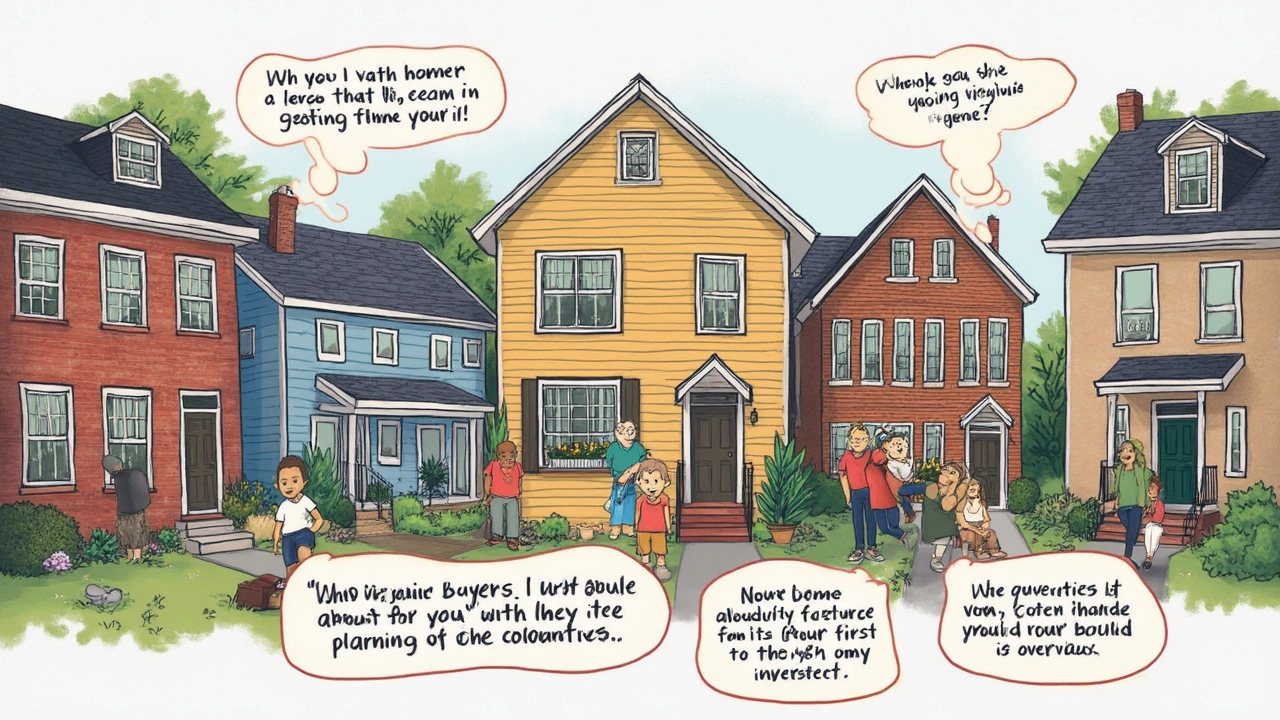A lot of people want to buy their first home in Virginia, but the thought of scraping together a hefty down payment and dealing with banks is enough to make anyone nervous. Still, it’s not as out of reach as it might look. Virginia actually has a pretty solid lineup of programs designed just for first-timers. If you’re struggling to save for a down payment or worried about getting approved for a loan, you’re not alone—and you’ve got options.
Here’s the deal: the Virginia Housing Development Authority, or VHDA (they call it Virginia Housing now), runs the main programs for first-time buyers. They offer low interest rates and down payment help, which can really lighten your load in those first few years. On top of that, other local options and grants can chip in to make things more affordable.
But the rules can be a little tricky, and there are different types of help for different situations. If you want to know whether you qualify or what you need for your application, you’ll want to keep reading. We’ll break down what it really looks like to get help buying your first place in Virginia—and how to give yourself the best shot at getting approved.
- What First-Time Homebuyer Programs Does Virginia Offer?
- How Do You Qualify?
- Types of Support and Financial Assistance
- Smart Tips for New Virginia Homebuyers
What First-Time Homebuyer Programs Does Virginia Offer?
If you’re searching for your first home in Virginia and feeling lost in the sea of options, you’re not alone. The main place to start is Virginia Housing (formerly VHDA). This agency runs several low-cost loan and grant programs built for regular folks buying their first place—not just for fancy new condos or perfect credit scores. A lot of people just like you have gotten help from these programs.
Here’s what you’ll find through Virginia Housing and some city or county resources:
- Virginia Housing Conventional Loans: These let you buy with a lower down payment—sometimes as low as 3%. There are income limits, but they’re usually pretty reasonable for most first-timers.
- Virginia Housing FHA, VA, and USDA Loans: FHA is easier to qualify for if your credit isn’t perfect. VA loans are for veterans and active military. USDA helps out folks in rural areas. Virginia Housing partners with all three.
- Down Payment Assistance Grants: This program gives you money for your down payment. You don’t have to pay it back if you stay in your home for a certain number of years—a nice break if you’re struggling to save.
- Closing Cost Assistance: Virginia Housing will sometimes pitch in for closing costs, which can take some of the sting out of that big day when you sign the papers.
Some counties and cities—like Richmond, Fairfax, and Virginia Beach—have their own first time homebuyer help, too. These local programs might offer special grants or even interest-free second loans, so it’s worth checking out what’s available where you want to buy.
Here’s a quick snapshot of the major Virginia first time homebuyer options:
| Program Name | Type of Assistance | Who Qualifies? |
|---|---|---|
| Virginia Housing Conventional Loan | Low down payment, low rate | First-time buyers under income limits |
| Down Payment Assistance Grant | Free down payment money | Buyers using a VHDA loan |
| Closing Cost Assistance | Help with closing costs | Eligible buyers (some restrictions) |
| City/County Grants | Varies by location | Buyers in certain areas |
If you live in Virginia and want to know what you can actually get, the best move is to start with the Virginia Housing website or ask a lender who’s worked with their programs before. You can also get a free homebuyer class certificate, which some programs require—another easy way in the door.
How Do You Qualify?
If you’re thinking about using a Virginia first time homebuyer program, you’ll want to make sure you actually fit the requirements before you get too excited. The rules are pretty clear, but a lot of folks miss small details and get tripped up. Here’s what you need to know about qualifying for programs from Virginia Housing and other local options.
First off, you usually need to be a first-time buyer—which means you haven’t owned a primary home for at least three years. So, even if you owned a place ages ago but have been renting or living with family, you may still count.
Next, you’ll want to check your income. Most programs have income limits, and they care about your whole household, not just who’ll be on the mortgage. For Virginia Housing loans, limits change by county and family size. For example, in Richmond, a household of four can make up to about $118,300 (as of 2024) and still qualify for most programs. In Northern Virginia, that number’s a lot higher because living there costs more. Because limits update pretty often, check Virginia Housing’s website or ask your loan officer for the current numbers in your area.
| Region | Household Size | Maximum Income (2024) |
|---|---|---|
| Richmond | 4 | $118,300 |
| Fairfax/Arlington | 4 | $160,600 |
| Virginia Beach | 4 | $120,900 |
Credit score is another biggie. Most homebuyer assistance loans want to see a minimum score—usually 620 or higher. Better scores get better rates. If your score’s iffy, you might still have a shot, but you’ll want to talk to a lender who works with Virginia Housing. They often help buyers find ways to bump up their score quickly.
Expect to provide proof of steady income for at least two years (think pay stubs or tax returns). If you’re self-employed, you’ll have to show a solid paper trail. Debts matter too; most programs want your total monthly debts—including your future mortgage—to be less than 45% of your monthly income.
- Be a first-time homebuyer (no homeownership in past 3 years)
- Stay under household income limits for your area and family size
- Meet a minimum credit score, usually 620 or above
- Show proof of steady income and manageable debts
- Plan to live in the home as your primary residence (not a rental)
Finally, most programs want you to take a homebuyer education course, which is way more helpful than it sounds. It’s online, easy to finish, and can save you from big first-timer mistakes. So before you even start house hunting, grab your documents, find your local income limits, check your credit, and sign up for the education class. You’ll be way ahead of the game.

Types of Support and Financial Assistance
Virginia actually has a few major options for first-time buyers. The most popular one is the Virginia Housing loan, run by the state. These loans come with below-average interest rates, which means your monthly payment could be lower than if you just walked into a bank and got a regular loan. If you need help with the down payment, Virginia Housing also has a big one: Down Payment Assistance Grants. These can cover up to 2.5% of your home's price—meaning less cash needed up front.
If you’re a military veteran or currently serving, the state’s Virginia Military Homebuyers Grant tosses in up to $10,000 for your down payment or closing costs. This money doesn’t need to be paid back, and it stacks on top of other Virginia Housing support, so it’s a good deal for military families.
First-timers might also qualify for a Mortgage Credit Certificate (MCC). This gives you a tax break every year, not just once. The MCC lets you claim part of the mortgage interest you pay on your annual taxes, and that adds up over time. According to the IRS, the savings can be up to $2,000 a year, depending on your loan and how much you owe in taxes.
"The Virginia Housing loan programs are built to remove barriers for first-time buyers—down payment help and below-market rates make a big impact." — Virginia Housing official website, 2025
Besides state options, some cities and counties in Virginia offer their own first-time buyer programs. For example, Fairfax County has a grant that covers up to $10,000 for down payments if your income is below a certain limit. Richmond and Norfolk also have local funds and classes that connect you to down payment or closing cost help, if you qualify.
| Program | What It Offers | Who Qualifies |
|---|---|---|
| Virginia Housing Loan | Lower interest rate home loan | First-time buyers, income limits apply |
| Down Payment Assistance Grant | Up to 2.5% of purchase price towards down payment | Paired with Virginia Housing loans |
| Military Homebuyers Grant | $10,000 toward down payment/closing | Military veterans & service members |
| Mortgage Credit Certificate | Annual federal tax break | First-time buyers, credit approval |
If you’re eyeing a specific Virginia first time homebuyer program, always check their current rules. Some programs fill up fast or change their terms when new state funding drops. To boost your chances, get your application in early and talk with a loan officer who knows all the ins and outs of these loans and grants. A quick phone call or even a seminar can connect you to more money than you might expect.
Smart Tips for New Virginia Homebuyers
Securing your first home in Virginia is simpler when you know a few key tricks up front. First things first, make sure your credit score is in decent shape. Most Virginia first time homebuyer programs look for a credit score of at least 620, but higher is always better for snagging lower interest rates. If your score’s not quite there, work on paying down existing debts and double-check for errors on your credit report—mistakes happen more often than you’d think and can make things harder for no good reason.
Another smart move is getting pre-approved for a mortgage before you even start house hunting. Pre-approval shows sellers you’re serious and lets you know your budget. VHDA lenders can give you a solid breakdown of exactly what you’ll qualify for under their homebuyer assistance options.
Don’t overlook programs that stack up. In Virginia, you can use state down payment help along with local city or county programs. For example, Richmond and Fairfax both have additional grants or zero-interest loans for first-time buyers. Combining help from several programs can shrink your out-of-pocket costs by thousands.
It’s also a good idea to take the required homebuyer education course seriously. Virginia Housing asks you to complete a free online course to get their support. Yes, it sounds basic, but the info can actually save you from expensive slip-ups like underestimating closing costs or forgetting about homeowners insurance. Plus, having that certificate in hand speeds up your application.
If you’re worried about hidden costs, keep an eye on things like HOA fees, property taxes, and maintenance expenses. Budget a little cushion for the first year so surprises won’t knock you flat. Here’s a quick comparison of typical out-of-pocket costs:
| Expense Type | Typical Cost (2025) |
|---|---|
| Down Payment (3%) | $10,000 - $12,000 on $350,000 home |
| Closing Costs | $5,000 - $8,000 |
| Annual Property Taxes | $2,800 - $4,200 |
| HOA Fees (if any) | $50 - $300/month |
And last but not least, don’t rush. Virginia’s VHDA loan programs have deadlines and limits, so plan ahead—set up a timeline for paperwork, house shopping, and final approvals. Reach out early to a certified VHDA lender; they walk you through the process and can flag any missing pieces before it’s crunch time. Staying organized makes the whole thing far less stressful and turns your first home into a real win.
